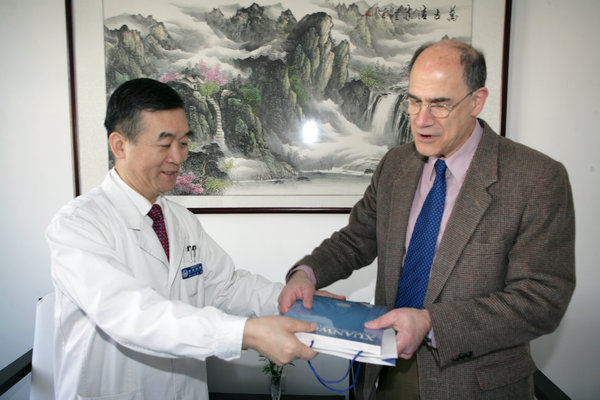Brains on his mind
 |
|
Mark Hallett (right) has worked with Chinese hospitals and doctors to research Parkinson's disease.[Photo provided to China Daily] |
A US doctor joins Chinese peers to push for Parkinson's breakthroughs.
In the past decade, 72-year-old American neurophysiologist Mark Hallett has flown regularly to China to work with his Chinese counterparts to expand and improve treatments of movement disorders and Parkinson's disease.
His most recent visit was highlighted by a Beijing ceremony at which he received the Friendship Award. The honor is the highest presented by the Chinese government to foreigners who have made significant contributions to China's social and economic development.
"It's a marvelous honor for me. It makes me feel good about being able to do what I have done with Chinese doctors in the past years," says Hallett, wearing a special tie with a typical Chinese design for the occasion.
Hallett, whose father was an ophthalmologist, became interested in medical science when he was a child. He later received his degree from the Harvard Medical School.
Having published more than 1,000 academic articles and more than 30 books on related topics, Hallett is one of the best-recognized scientists researching neurophysiologic disease.
He has been the director of the neurology department of the National Institute of Neurological Disorders and Stroke, a subordinate of the National Institutes of Health in the United States. He is also chairman of the International Clinical Neurophysiology Society.
Hallett made his first visit to China in the late 1990s as a member of an educational program carried out in Shanghai by the American Academy of Neurology.
As many Chinese researchers and doctors have received advanced training at the NIH, Hallett maintained contact with some of them after they returned to China.
The connections led to his later collaboration with Xuanwu Hospital of the Capital Medical University in Beijing, after Zhuang Ping, one of his earliest fellows, became a doctor there.
In 2004, Zhuang invited Hallett to work with her hospital as a foreign medical expert. Their collaboration has grown steadily, and Hallett visits China annually for weeklong academic exchanges, medical teaching and scientific research.
"His professional and meticulous attitude as well as skillfulness while checking the patients opened our eyes. He really provides a world-class reference for us to improve ourselves," says Zhuang.
Hallett says he is impressed by the huge number of patients Chinese hospitals have to take in, which is a big challenge for Chinese doctors.
















